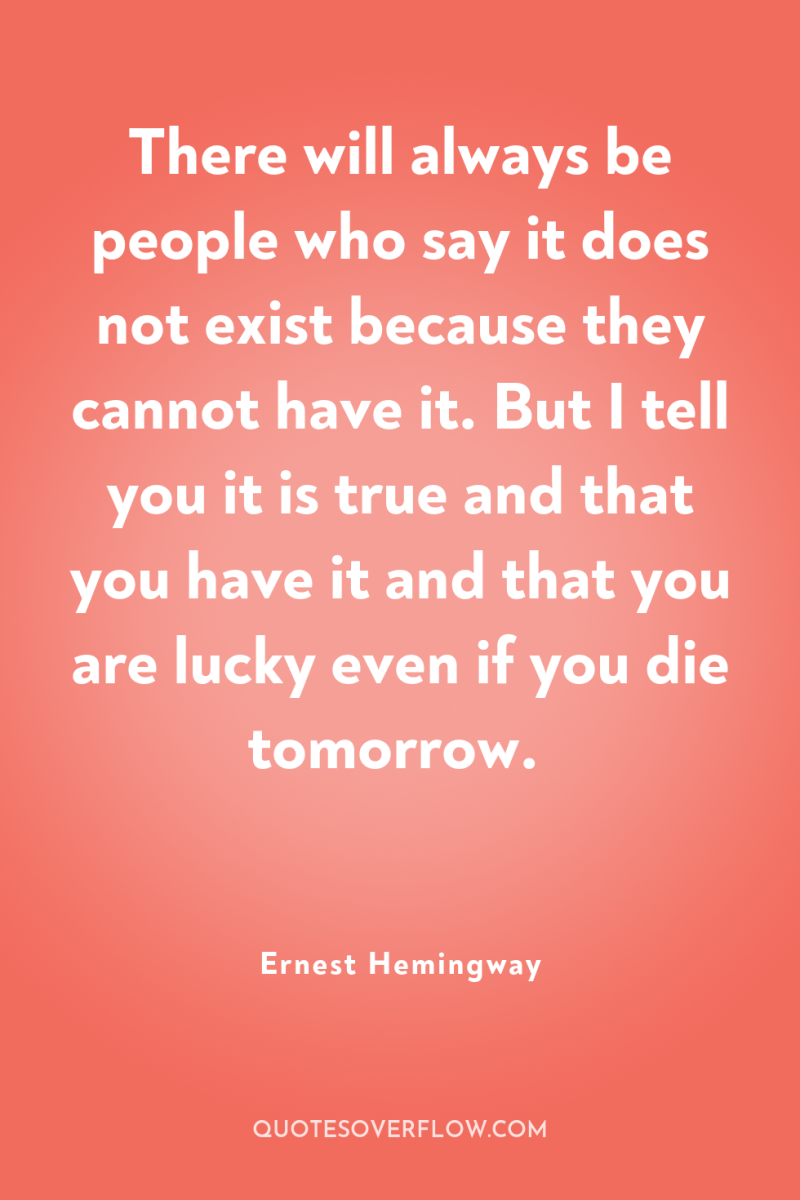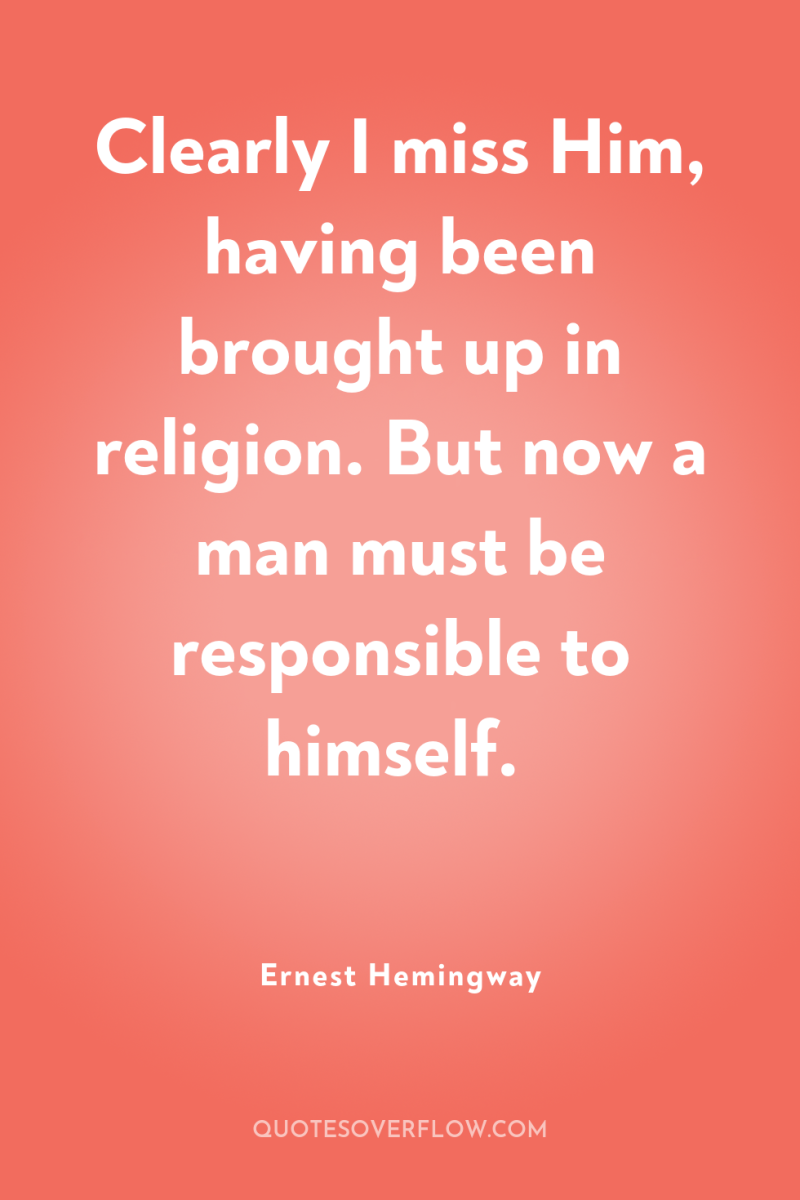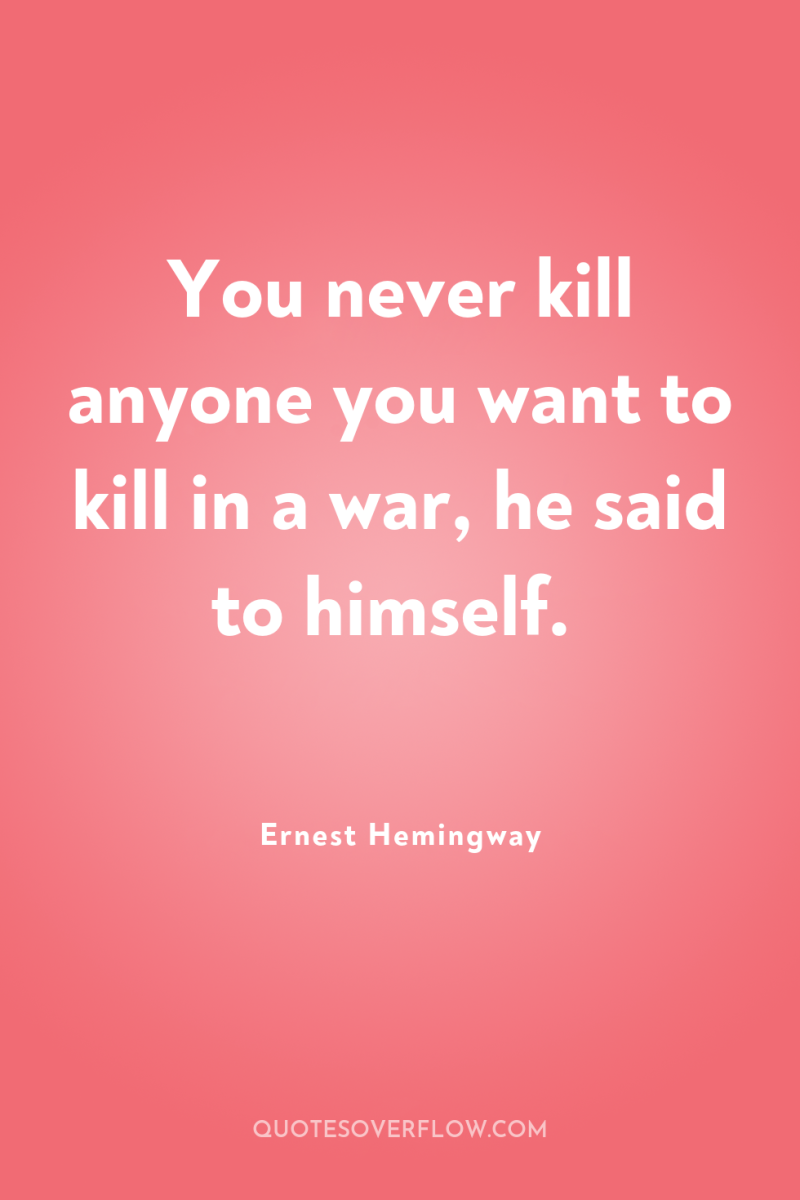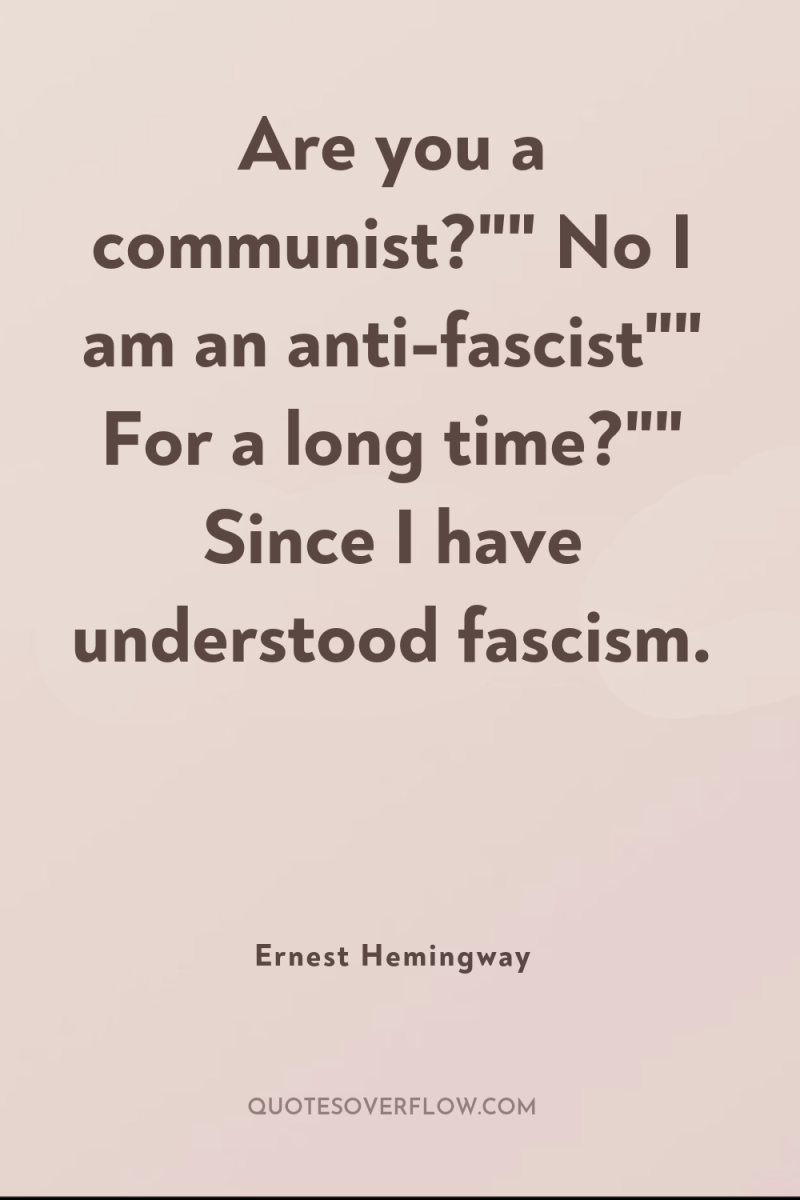1
How little we know of what there is to know. I wish that I were going to live a long time instead of going to die today because I have learned much about life in these four days; more, I think than in all other time. I'd like to be an old man to really know. I wonder if you keep on learning or if there is only a certain amount each man can understand. I thought I knew so many things that I know nothing of. I wish there was more time.Ernest Hemingway
2
Dying was nothing and he had no picture of it nor fear of it in his mind. But living was a field of grain blowing in the wind on the side of a hill. Living was a hawk in the sky. Living was an earthen jar of water in the dust of the threshing with the grain flailed out and the chaff blowing. Living was a horse between your legs and a carbine under one leg and a hill and a valley and a stream with trees along it and the far side of the valley and the hills beyond.Ernest Hemingway

3
There will always be people who say it does not exist because they cannot have it. But I tell you it is true and that you have it and that you are lucky even if you die tomorrow.Ernest Hemingway

4
Clearly I miss Him, having been brought up in religion. But now a man must be responsible to himself.Ernest Hemingway
5
That's my town, ' Joaquin said. 'What a fine town, but how the buena gente, the good people of that town, have suffered in this war.' Then, his face grave, 'There they shot my father. My mother. My brother-in-law and now my sister.' 'What barbarians, ' Robert Jordan said. How many times had he heard this? How many times had he watched people say it with difficulty? How many times had he seen their eyes fill and their throats harden with the difficulty of saying my father, or my brother, or my mother, or my sister? He could not remember how many times he heard them mention their dead in this way. Nearly always they spoke as this boy did now; suddenly and apropos of the mention of the town and always you said, 'What barbarians.Ernest Hemingway
6
You felt, in spite of all bureaucracy and inefficiency and party strife something that was like the feeling you expected to have and did not have when you made your first communion. It was a feeling of consecration to a duty toward all of the oppressed of the world which would be as difficult and embarrasing to speak about as religious experience and yet it was as authentic as the feeling you had when you heard Bach, or stood in Chartres Cathedral or the Cathedral at León and saw the light coming through the great windows; or when you saw Mantegna and Greco and Brueghel in the Prado. It gave you a part in something that you could believe in wholly and completely and in which you felt an absolute brotherhood with the others who were engaged in it. It was something that you had never known before but that you had experienced now and you gave such importance to it and the reasons for it that you own death seemed of complete unimportance; only a thing to be avoided because it would interfere with the performance of your duty. But the best thing was that there was something you could do about this feeling and this necessity too. You could fight.Ernest Hemingway
7
How would that premise stand up if he examined it? That was probably why the Communists were always cracking down on Bohemiansism. When you were drunk or when you committed adultery you recognised your own personal fallability of that so mutable substitute for the apostles' creed, the party line. Down with Bohemianism, the sin of Majakowski.Ernest Hemingway

8
You never kill anyone you want to kill in a war, he said to himself.Ernest Hemingway

9
Are you a communist?"" No I am an anti-fascist"" For a long time?"" Since I have understood fascism.Ernest Hemingway
10
I have watched them all day and they are the same men that we are. I believe that I could walk up to the mill and knock on the door and I would be welcome except that they have orders to challenge all travelers and ask to see their papers. It is only orders that come between us. Those men are not fascists. I call them so, but they are not. They are poor men as we are. They should never be fighting against us and I do not like to think of the killing. .Ernest Hemingway
11
I hope I am not for the killing, Anselmo was thinking. I think that after the war there will have to be some great penance done for the killing. If we no longer have religion after the war then I think there must be some form of civic penance organized that all may be cleansed from the killing or else we will never have a true and human basis for living. The killing is necessary, I know, but still the doing of it is very bad for a man and I think that, after all this is over and we have won the war, there must be a penance of some kind for the cleansing of us all. .Ernest Hemingway
12
You had to have these peasant leaders quickly in this sort of war and a real peasant leader might be a little too much like Pablo. You couldn't wait for the real Peasant Leader to arrive and he might have too many peasant characteristics when he did. So you had to manifacture one. At that, from what he had seen of Campesino, with his black beard, his thick negroid lips, and his feverish, staring eyes, he thought he might give almost as much trouble as a real peasant leader. The last time he had seen him he seemed to have gotten to believe his own publicity and think he was a peasant.Ernest Hemingway
13
I had an inheritance from my father, It was the moon and the sun. And though I roam all over the world, The spending of it’s never done.Ernest Hemingway
14
How little we know of what there is to know.Ernest Hemingway
15
Let us sleep, " he said and he felt the long light body, warm against him, comforting against him, abolishing loneliness against him, magically, by a simple touching of flanks, of shoulders and of feet, making an alliance against death with him.Ernest Hemingway
16
To understand is to forgive.Ernest Hemingway
17
I love thee as I love all that we have fought for. I love thee as I love liberty and dignity and the rights of all men to work and not be hungry. I love thee as I love Madrid that we have defended and as I love all my comrades that have died. And many have died. Many. Many. Thou canst not think how many. But I love thee as I love what I love most in the world and Ilove thee more.Ernest Hemingway
18
What you have with Maria, whether it lasts just through today and a part of tomorrow, or whether it lasts for a long life is the most important thing that can happen to a human being. There will always be people who say it does not exist because they cannot have it. But I tell you it is true and that you have it and that you are lucky even if you die tomorrow.Ernest Hemingway
19
He felt the long light body, warm against him, comforting against him, abolishing loneliness against him, magically, by a simple touching of flanks, of shoulders and of feet, making an alliance against death with him.Ernest Hemingway
20
He smelled the odor of the pine boughs under him, the piney smell of the crushed needles and the sharper odor of the resinous sap from the cut limbs.. This is the smell I love. This and fresh-cut clover, the crushed sage as you ride after cattle, wood-smoke and the burning leaves of autumn. That must be the odor of nostalgia, the smell of the smoke from the piles of raked leaves burning in the streets in the fall in Missoula. Which would you rather smell? Sweet grass the Indians used in their baskets? Smoked leather? The odor of the ground in the spring after rain? The smell of the sea as you walk through the gorse on a headland in Galicia? Or the wind from the land as you come in toward Cuba in the dark? That was the odor of cactus flowers, mimosa and the sea-grape shrubs. Or would you rather smell frying bacon in the morning when you are hungry? Or coffee in the morning? Or a Jonathan apple as you bit into it? Or a cider mill in the grinding, or bread fresh from the oven? .Ernest Hemingway
21
I obscenity in the milk of my shame.Ernest Hemingway
22
He did not care for the lying at first. He hated it. Then later he had come to like it. It was part of being an insider but it was a very corrupting business.Ernest Hemingway
23
He had only one thing to do and that was what he should think about and he must think it out clearly and take everything as it came along, and not worry. To worry was a bad as to be afraid. It simply made things more difficult.Ernest Hemingway
24
He was just a coward and that was the worst luck any many could have.Ernest Hemingway
25
Today is only one day in all the days that will ever be.Ernest Hemingway
26
Now, feel. I am thee and thou art me and all of one is the other. And feel now. Thou hast no heart but mine.Ernest Hemingway